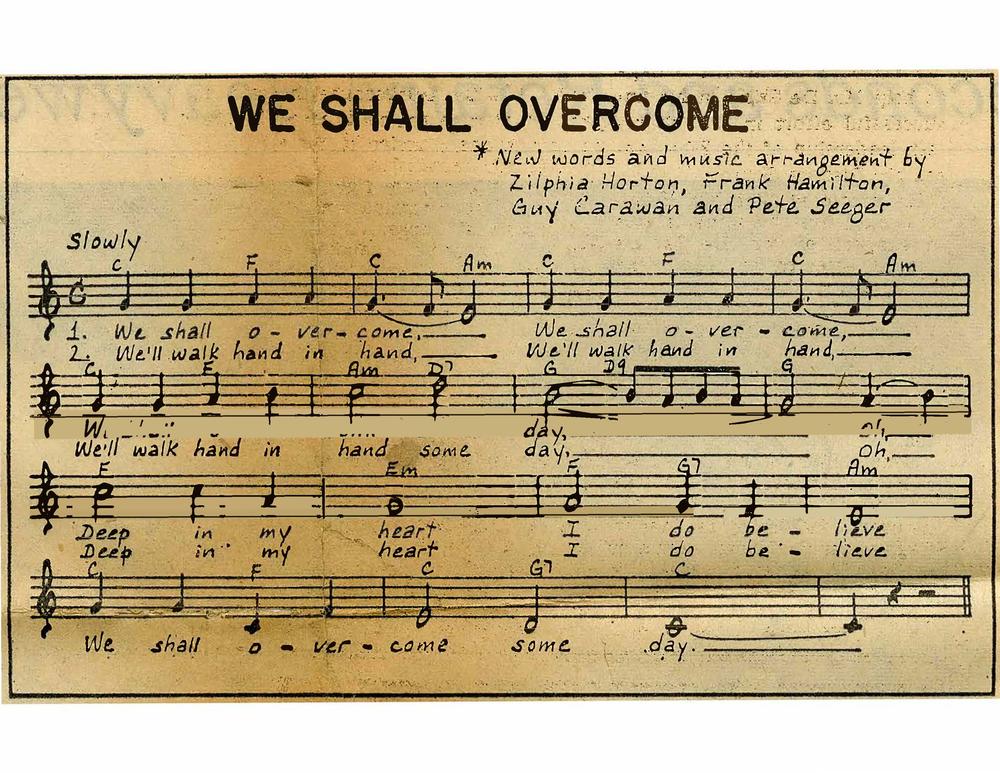
Caption
Sheet music from the version of the song "We Shall Overcome" that became one of the most famous folk songs of all time.
Credit: Ludlow Music, Inc.
When we think about “folk music,” most of us think about music that sounds a certain way. But really, folk music is the stuff we pass around to each other, that we sing around the fire, the songs that we let anyone join in on. Salvation South editor Chuck Reece explains the origins of one of the most famous folk songs in this week’s commentary.

Sheet music from the version of the song "We Shall Overcome" that became one of the most famous folk songs of all time.
What exactly does the term “folk music” mean? Now the bluntest definition I ever heard was simple: It’s music for folks.
But that definition, I think, is a little too shallow. Really, Folk Music is the music we teach each other. It’s the music we sing together. Down the long history of American culture, it has supplied our anthems, the songs we sing in moments of trial, the tunes that inspire us to keep pushing toward a better world.
One of the greatest folk songs is one you probably know — “We Shall Overcome.”
Song: Pete Seeger’s “We Shall Overcome”
That’s the late great folk singer Pete Seeger doing it. The song was originally called “I Will Overcome.” In the early twentieth century, striking labor union members adopted it to keep their spirits high as they walked picket lines. And they changed it to “We Will Overcome.”
In the 1950s, the song made its way to some musicians who were swapping songs and teaching at the Highlander Folk School in East Tennessee. Specifically, Pete Seeger and one of his pickin’ buddies, a fellow named Frank Hamilton.
Hamilton, who was an exceptional student of Black gospel music, decided the song should have a rhythm more suited to marching, so he did the song over in twelve-eight time. Bah-bah-bah, bah-bah-bah, we will overcome. Then Seeger, who thought the song would sing better if you substituted the word “shall” for “will,” put his mark on the song.
Not long after, a very important Georgian visited the Highlander Folk School — the Reverend Doctor Martin Luther King Junior. He heard the song and just couldn’t get the melody out of his head. And that’s how “We Shall Overcome” became the anthem of the Civil Rights Movement.
The song was passed from group to group over the years and wound up being one of the most important tunes in American history.
And here’s the kicker: that fellow Frank Hamilton is still alive and, at age eighty-nine, is living right here in Georgia. And over in Decatur, just a few miles from the studio where I’m sitting right now, he runs a little institution called the Frank Hamilton School, which teaches hundreds of regular Georgians how to play and how to sing and how to use music to bring people together.
That, y’all, is how folk music works.
Right now, we have a great story about Frank Hamilton in the online magazine I edit called Salvation South. You can come read it at SalvationSouth.com.
Salvation South editor Chuck Reece comments on Southern culture and values in a weekly segment that airs Fridays at 7:45 a.m. during Morning Edition and 4:44 p.m. during All Things Considered on GPB Radio. You can also find them here at GPB.org/Salvation-South and please download and subscribe on your favorite podcast platform as well.
